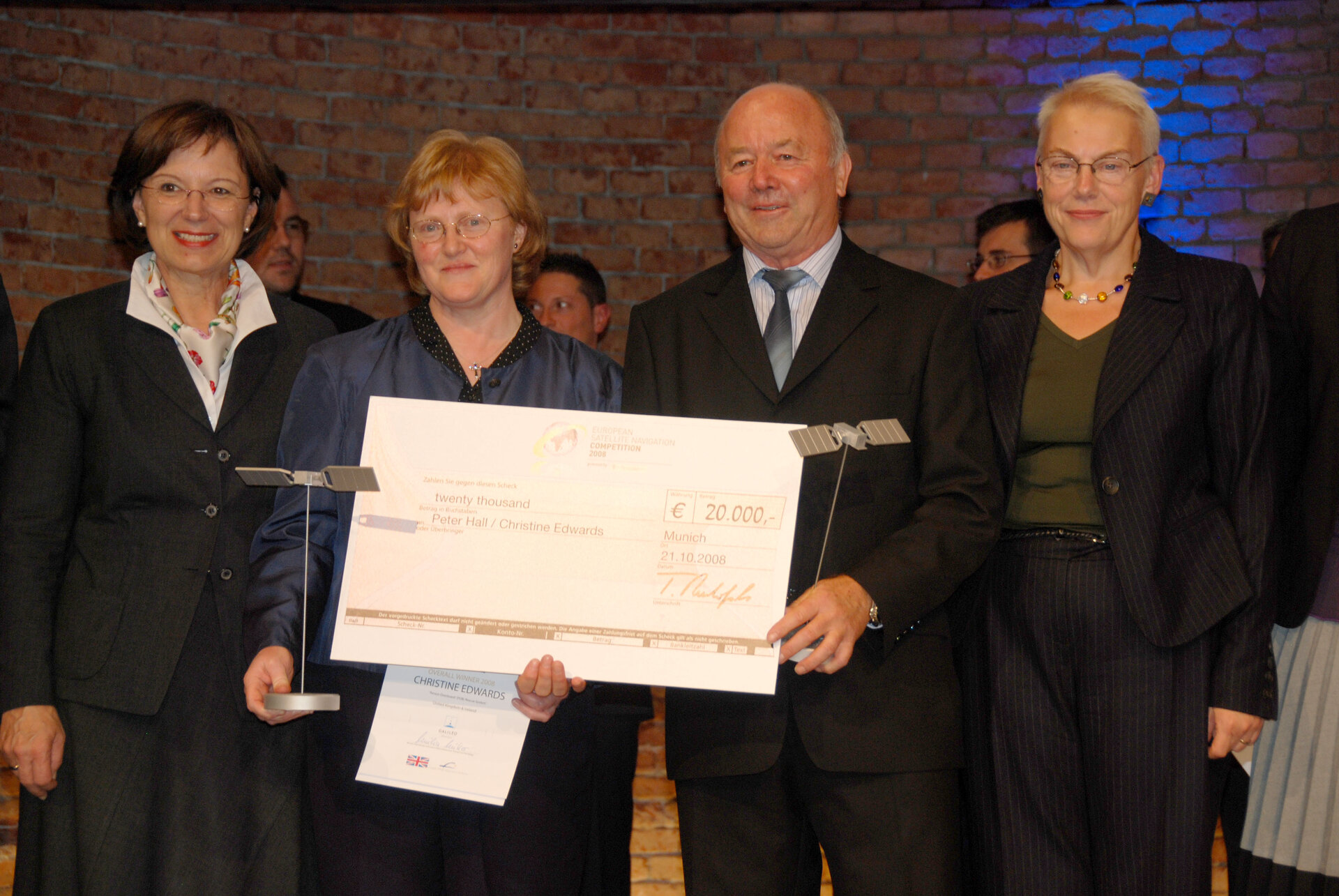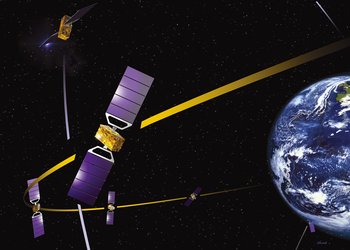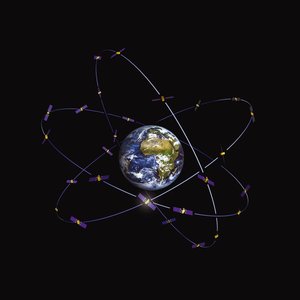Man overboard rescue system wins international navigation prizes
Innovators Peter Hall and Christine Edwards from British company Sci-Tech were awarded this year's Galileo Masters 2008 and the EGNOS special prize in the European Satellite Navigation Competition for their novel tracking system for seamen falling overboard.
The European Satellite Navigation Competition (ESNC) is an international innovation competition with 13 high-tech regions that awards the best ideas for innovative applications in the field of satellite navigation, and is oriented toward companies, entrepreneurs, research institutes, universities, and private individuals.
The winning proposal is a straightforward yet genial system for fast location of 'man overboard', known among sailors as an MOB. It combines two available technologies, positioning by satellite navigation systems and radio communication, to create a functionality which helps in situations where it is the matter of life and death.
The positioning is provided by the Global Navigation Satellite System (GNSS), in the first instance by the Global Positioning System (GPS) and the European Geostationary Navigation Overlay Service (EGNOS). In the future it can work with the European satellite navigation system Galileo which will provide greater accuracy. The communication is done on one of the common radio channels used at sea.
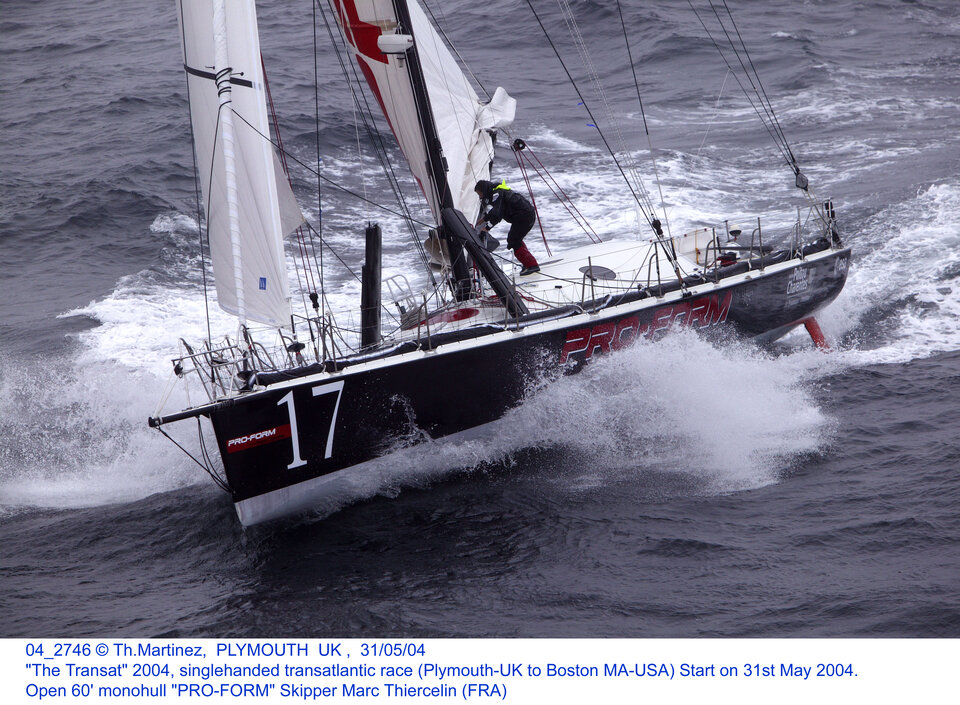
Hall and Edwards’ MOB tracking system, which won initially in the United Kingdom and Ireland region, is made up of a central unit installed on the ship and mobile units worn by all crew members. When a man falls overboard the mobile unit is detached automatically from the life jacket when it inflates, and on hitting the water it starts transmitting its position to the central unit on the ship. The signal is plotted as a waypoint on the ships navigation device, and the ship can easily return to the position of the MOB. The signal is transmitted on an open radio channel so the MOB position can also be picked up by other ships.
For this idea the winners received the coveted Galileo Masters 2008 award and a cash prize of €20.000. The European Satellite Navigation Competition jury was not alone in their choice of winner. The European GNSS Supervisory Authority (GSA), which, this year, had assigned a special prize for the best application of EGNOS was just as convinced by this safety-critical system based on EGNOS as the international jury in the choice of the overall winner.
European Satellite Navigation Competition

The European Satellite Navigation Competition objective is to find new ideas for commercially viable global navigation satellite system applications, and to strengthen the international collaboration, particularly with regard to the development of applications and services made possible by the European satellite navigation system Galileo.
Now in its fifth year, the competition has grown to become one of Europe’s largest networks for satellite navigation down-stream applications and covers 11 high-tech regions in Europe and two outside Europe: Queensland in Australia and Taiwan. This year 525 entries were received, double that of previous years.
The European Satellite Navigation Competition is organised by the Anwendungszentrum GmbH Oberpfaffenhofen and the Munich ITC trade fair SYSTEMS. The competition is run under the patronage of the Bavarian Ministry of Economic Affairs, Infrastructure, Transport and Technology, and supported by the German Aerospace Center (DLR) and ESA through its Technology Transfer Programme Office.
This year, special topic prizes were given by sponsors T-Systems, DHL Innovation Center, ESA’s Technology Transfer Programme, Industrial Technology Research Institute of Taiwan and European GNSS Supervisory Authority (GSA).
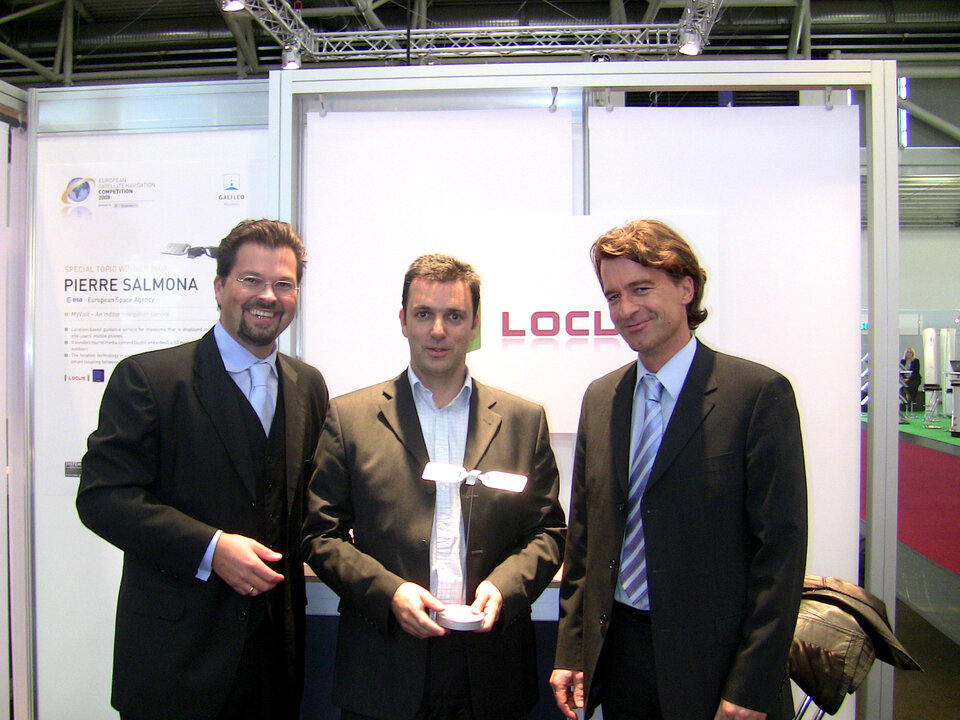
ESA’s Technology Transfer Programme’s special topic prize
The winner is Pierre Salmona from the French start-up company, Locus, for a mobile phone-based museum guide which by combining WiFi and stationary pseudo-satellites, so-called pseudolites, allows indoor navigation.
T-Systems / DHL Innovation Center’s special topic prize
The winner was the Taiwanese researcher Jung-Huang Liao for the tourism 'CITITOUR' application for backpackers, group travellers and professional tour guides which encompasses mobility, locality, touring and Web 2.0. The winners were Dr Mario Neugebauer and Dr Jürgen Anke from the Dresden-based company Ubigrate. Their system 'LoVoTrack' measures in real-time the position and load volume of delivery vehicles. This information is sent to the transport centre which then can optimise the usage of their transportation fleet.
Industrial Technology Research Institute of Taiwan’s special topic prize
The winner was the Taiwanese researcher Jung-Huang Liao for the tourism 'CITITOUR' application for backpackers, group travellers and professional tour guides which encompasses mobility, locality, touring and Web 2.0.

'CITITOUR' turns travellers into tour guides and at the same time makes available mobile exchange of experiences.
All winners were honoured for their creativity and technological competence by the patroness and Bavarian Minister for Economics, Mrs Emilia Müller at the award event last Tuesday in the Court Church of All Saints of the Munich Residence, in Germany.
Regional winners
Baden-Württemberg (Germany)
Winner: Erich Franke from German company Afusoft.
Idea: A system which connects the signals of satellite navigation, mobile telephony and cargo-tags to a secure surveillance network for warehouses and transportation. It protects valuable freight and dangerous goods against theft and warns on incorrect loading or unloading.
Lower Saxony (Germany)
Winner: Frank Brennecke from the German company OECON.
Idea: The hybrid container management system 'LogiLoc' that integrates satellite signals with GSM, RFID and WiFi in a multi-sensor box and thus allows the location of containers independent of the availability of any specific positioning technology both in open and closed spaces.

Bavaria (Germany)
Winners: Alex Ackerman and Yossef Shiri from the Swedish-Israeli company Road-Guard.
Idea: The mobile phone-based 'GreenDrive' system which predicts the routes ahead and recommends to the driver the most economical speed within the given speed limit. The system assists the driver to improve his or her driving-style to reduce the fuel consumption by 15-25%.
Hessen (Germany)
Winner: Robert Carter from Luxembourg.
Idea: The 'IPAYMO – I PAY Mobile' system which uses the precise time signal and position data of satellite navigation systems to increase the security of electronic, mobile and online-based payments, in order to stem fraud and data abuse.
Madrid (Spain)
Winners: Pablo de Miguel and Rafael Olmedo from the Spanish National Institute for Aerospace Technology INTA.
Idea: An 'eWarning' system that informs drivers in real time of obstacles and dangers on the roads ahead before they are visible.

Lombardy (Italy)
Winners: Giorgio Soldavini and Ivan Allevi from the Italian company Allix.
Idea: A tracking platform that facilitates the very precise surveillance of fleets by combining low-cost standard GPS receivers with EGNOS. The initial version is already used to control the transport of toxic waste.
Nice – Sophia Antipolis (France)
Winner: Lokesh Bitra from India.
Idea: The 'Yellow Tags' system which enables the marking of real objects on mobile navigation devices and GPS mobile phones with the help of visual-virtual tags.
North Rhine-Westphalia (Germany)
Winners: Prof. Dr Jürgen Rossmann, Dr Michael Schluse, Arno Bücken and Petra Krahwinkler from the Institute of Man-Machine-Interaction of RWTH in Aachen, Germany.
Idea: The 'Visual GPS' system which combines robotic-localisation technologies with satellite navigation data in order to increase the accuracy of using GPS in forestry management.
Prague (Czech Republic)
Winner: Dr Jaroslav Jansa from the Czech company Immobiliser Central Europe.
Idea: The mobile, wireless rescue service 'IHY – I Help You' that simplifies the victim’s communication with the relevant rescuers. It can be used by people with health problems as well as by people who want to protect themselves against attacks of violence.

Queensland (Australia)
Winners: Dr Charles Worringham from Queensland University of Technology and Bruce Satchwell from the Australian company Alive Technologies.
Idea: A remote monitoring system for the rehabilitation of patients with heart disease, who would hardly have any opportunities, due to time reasons or extreme distances as in Australia, to participate to a cardiac rehabilitation programme.
South Holland (the Netherlands)
Winners: Dutchmen Alex Beek, Jan van Rossum and Maarten Uyterlinde from Food Process Innovations BV.
Idea: The system 'AgriBase' which reduces the administrative work of farmers by documenting the production of their agricultural produce and creates production chain transparency for consumers.
Taiwan
Winners: Terence T. Huang, Alan C.-Y. Lin and Ted. C.-Y. Chang from Quanta Computer in Taiwan.
Idea: The Web 2.0 platform 'YouCast' which provides location-based videos on cellular phones in real time.


